Rectal Cancer: 20% Risk Reduction Thanks to Dietary Fibre Intake. Systematic Review and Meta-Analysis
- PMID: 31336939
- PMCID: PMC6683071
- DOI: 10.3390/nu11071579
Rectal Cancer: 20% Risk Reduction Thanks to Dietary Fibre Intake. Systematic Review and Meta-Analysis
Abstract
The aim of this systematic review and meta-analysis was to evaluate the association between dietary fibre intake and rectal cancer (RC) risk. In January 2019, a structured computer search on PubMed/Medline, Excerpta Medica dataBASE (EMBASE) and Scopus was performed for studies reporting the results of primary research evaluating dietary fibre intake in women and men as well as the risk of developing RC. Preferred Reporting Items for Systematic Reviews and Meta-Analyses (PRISMA) recommendations were followed. Highest vs. lowest fibre concentrations was compared. The Egger test was used to estimate publication bias. Heterogeneity between studies was evaluated with I2 statistics. The search strategy identified 912 papers, 22 of which were included in our meta-analysis. Having evaluated a total of 2,876,136 subjects, the results suggest a protective effect of dietary fibre intake on RC prevention. The effect Size (ES) was [0.77 (95% CI = 0.66-0.89), p-value = 0.001)]. Moderate statistical heterogeneity (Chi2 = 51.36, df = 21, I2 = 59.11%, p-value = 0.000) was found. However, no publication bias was found, as confirmed by Egger's linear regression test (Intercept -0.21, t = -0.24, p = 0.816). The findings suggest that dietary fibre intake could be protective against RC, with a clinically relevant reduction of RC risk. Identifying preventive measures to avoid the development of RC, especially by following a healthy lifestyle including healthy diet, is pivotal.
Keywords: diet; dietary fibre; fibre; rectal cancer.
Conflict of interest statement
The authors declare no conflict of interest.
Figures
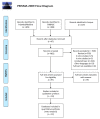
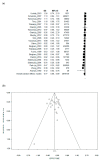

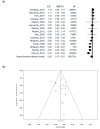

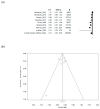
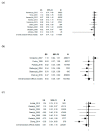
References
-
- Internation Agency for Reseach on Cancer Colorectum: Factsheet. [(accessed on 18 March 2019)]; Available online: https://gco.iarc.fr/today/data/factsheets/populations/900-world-fact-she....
-
- World Cancer Research Fund International/American Institute for Cancer Research . Countinous Update Project Report: Diet, Nutrition, Physical Activity and Colorectal Cancer. World Cancer Research Fund International/American Institute for Cancer Research; London, UK: 2017.
-
- Zamora-Ros R., Barupal D.K., Rothwell J.A., Jenab M., Fedirko V., Romieu I., Aleksandrova K., Overvad K., Kyro C., Tjonneland A., et al. Dietary flavonoid intake and colorectal cancer risk in the European prospective investigation into cancer and nutrition (EPIC) cohort. Int. J. Cancer. 2017;140:1836–1844. doi: 10.1002/ijc.30582. - DOI - PMC - PubMed
Publication types
MeSH terms
Substances
LinkOut - more resources
Full Text Sources
Medical
Miscellaneous

